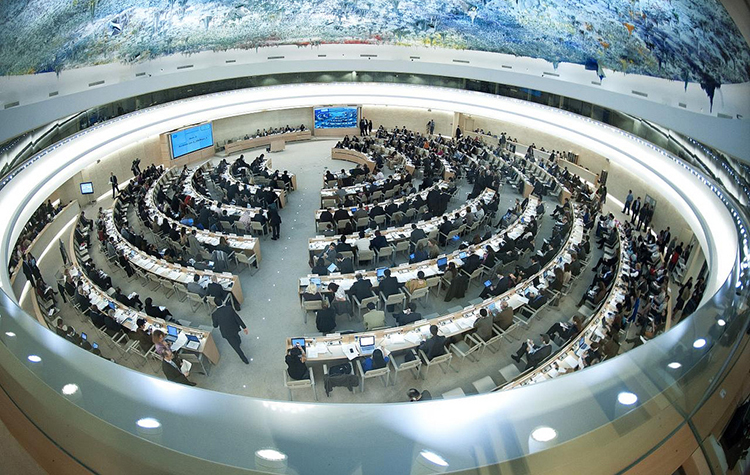FORUM-ASIA organised and participated in several side events during the 38th regular session of the UN Human Rights Council. They spanned the following topics: freedoms of expression, assembly and association in elections in Asia; extrajudicial killings of human rights defenders; foreign policy and human rights in the Global South; and Commonwealth States’ pledges at the Human Rights Council, as well as human rights situations in India, Myanmar, and the Philippines.
Freedoms of Expression, Assembly and Association in Elections in Asia
FORUM-ASIA organised a side event on freedoms of expression, assembly and association in elections in Asia together with Human Rights Watch and the International Commission of Jurists (ICJ) on 20 June 2018. The event was moderated by Laila Matar, Deputy Director for United Nations of Human Rights Watch.
Kingsley Abbott of ICJ spoke on the environment ahead of elections in the region with examples from Thailand and Cambodia. On Thailand, he said that the military government imposes numerous restrictions on rights and freedoms, including by detaining people without any charges and trying them in military courts. The international community, he said, is yet to adequately pressure the government. Instead they have tried to normalise relations with the government, hoping to induce it to hold elections, he added. However, there are few signs of the possibility of elections being held. Turning to the situation in Cambodia, he said that civil society space is closed, rather than restricted. The dissolution of the main opposition political party, mass surveillance, and threats against those who support the opposition are only a few examples. He added that these are all done in the name of ‘rule of law’ and by making reference to the particularity of the country.
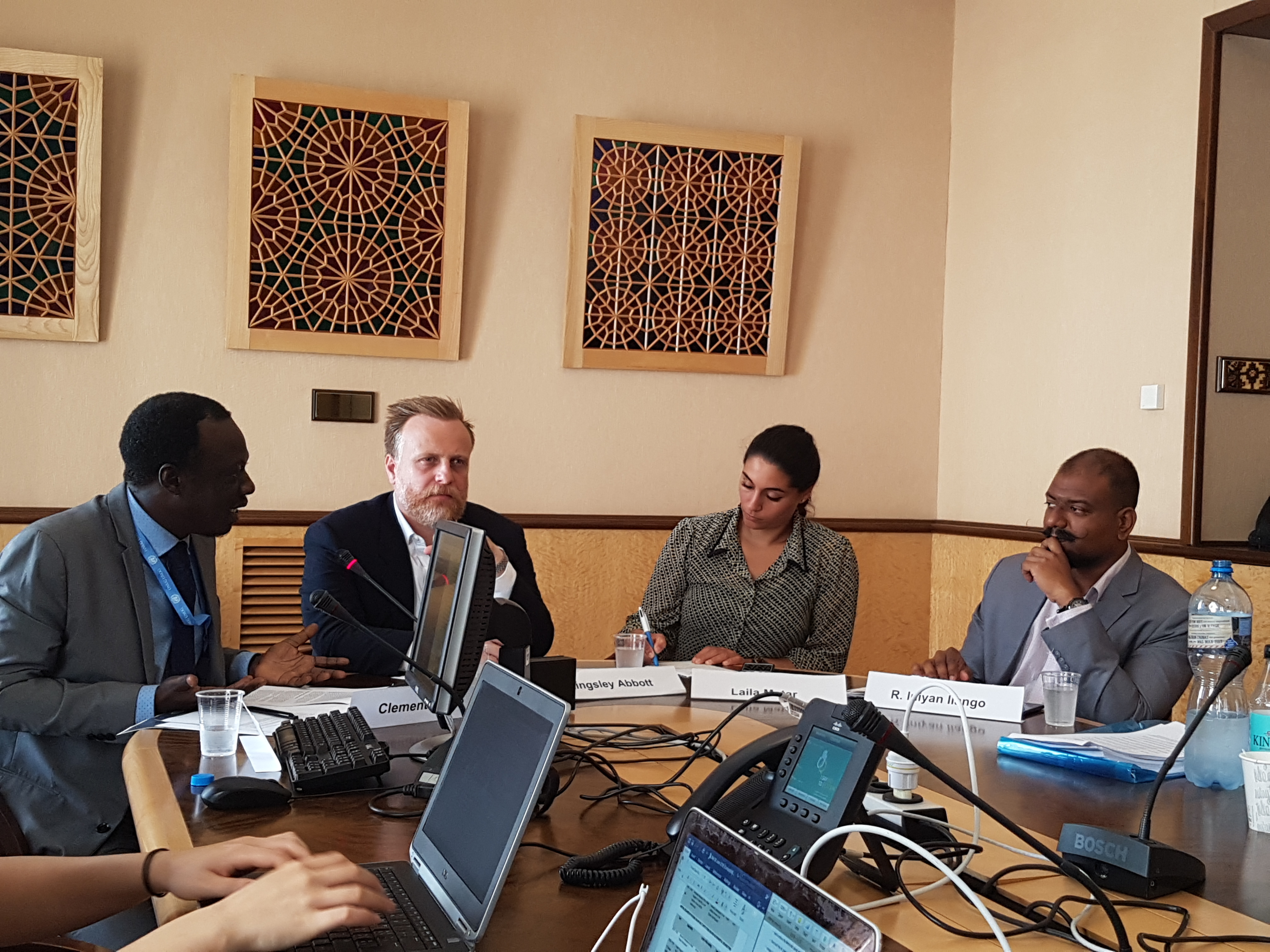
Iniyan Ilango of FORUM-ASIA spoke of examples from South Asia. He said that in Bangladesh, civil society faces pressure under the so-called ‘war on drugs’, which has led to alleged extrajudicial killings of human rights defenders. The last elections were heavily contested and saw violence, and there are signs that the next elections may go down the same path. On the Maldives, he said that the country underwent a transition towards democracy in 2008 but this was interrupted in 2012. With legal restrictions on public gatherings, the misuse of defamation and restrictions on civil society, it is clear that the situation in Maldives has worsened recently and the democratic environment required for elections has been compromised.
Speaking more generally on the importance on freedoms of expression and of assembly for elections, he stressed the importance of two specific reports on elections by the former Special Rapporteur on the rights to freedom of peaceful assembly and of association and the former Special Rapporteur on Freedom of Expression. These reports outline core standards and benchmarks that states need to meet before, during and after elections. He further emphasised that it is important for states, the UN and civil society to use these as strong reference points and build on them.
The UN Special Rapporteur on the rights to freedom of peaceful assembly and of association, Clement Voule, acknowledged the importance of the report of his predecessor on elections and emphasised the importance of the freedoms of peaceful assembly and of association with respect to elections. He further added that levels of freedoms of assembly and of association within a country impacts the legitimacy of the elections and, in turn, determines the legitimacy of the elected government. He underlined that it is important to assess the enjoyment of these freedoms and people’s engagement both before and after the elections. In addressing the suggestion that there should be an assessment of a situation prior to the election, he further stressed that it is always easier to solve problems at the early stage rather than when it is too late. For this reason, he asked the participants to contact his mandate when they see something going wrong before, during or after elections.
Launch of HRD Memorial Report: “Stop the Killings”
FORUM-ASIA co-organised a side event to launch the HRD Memorial Report, “Stop the Killings” together with Amnesty International, Front Line Defenders, FIDH and OMCT on 20 June 2018. The event was moderated by Stella Anastasia of OMCT.
Mary Lawlor of Front Line Defenders introduced the report, which used research by local NGOs from Brazil, Colombia, the Philippines, Guatemala, Honduras, and Mexico—countries where 80 percent of killings of human rights defenders took place in 2017. She added that the HRDs killed usually work on LGBTI rights, women’s rights, and land rights. In most cases, no investigations were carried out into the killings. She concluded by saying that religious beliefs, impunity and governments’ suppressive policies are the main reasons behind these incidents.
Ellecer Carlos of iDEFEND (Philippines) described violence and threats against HRDs. The HRDs who stand against the Government’s so-called ‘war on drugs’, are often labelled by the government as supporters of criminals making them easy targets for attacks. The government uses strong propaganda, which distorts public perception of HRDs. He added that the ‘war on drugs’ is used as a tool to establish an authoritarian regime while normalising impunity. He concluded by asking the Human Rights Council to establish an international investigation into extrajudicial killings in the Philippines.
Olga Guzman of the Comisión Mexicana de Defensa y Promoción de los Derechos Humanos described the situation of HRDs in Mexico and stated that it is similar to that of the Philippines. The Mexican government often tends to describe HRDs as supporters of drug dealers. Thousands have been disappeared or displaced as a result of the country’s ‘war on drugs’, which is a high number considering that there is no civil war in the country. Despite international pressure, the situation has remained the same and torture has become a normal way of investigation. However, brave HRDs in the country continue their job, she concluded.
The Special Rapporteur on extrajudicial, summary or arbitrary executions, Agnes Callamard, added that HRDs are killed not only by governments, but also by other actors with various interests. She stated that some governments, in order to suppress HRDs, label them as criminals—ranging from supporters of drug dealers to terrorists. This has often resulted in attacks against them and in some countries even execution. She further stressed that prevention is very important and that investigations must be carried out into the killings of HRDs. She ended by discussing plans to draft guidelines to help HRDs investigate such incidents.
‘War on Drugs’ and Declining Democracy in the Philippines
FORUM-ASIA organised a side event titled: War on Drugs’ and Declining Democracy in the Philippines together with Franciscans International, World Organisation against Torture (OMCT), International Federation for Human Rights (FIDH), Fastenopfer, and Human Rights Watch, on 21 June 2018. The event was moderated by Budi Tjahjono of Franciscans International.
Angel Cortez of the Association of Major Religious Superiors of the Philippines argued that all killings related to the so-called ‘war on drugs’ are carried out without due process. He added that the ‘war’ is only against the poor while the powerful are left untouched. He further stated that despite international pressure on the government and reporting by NGOs of the abuses, nothing has changed on the ground.
Ellecer Carlos of the Philippine Alliance of Human Rights Advocates (PAHRA) and In Defense of Human Rights and Dignity Movement (iDEFEND) argued that the ‘war on drugs’ is an instrument used by the government to target those who protest against the government’s policies. He further emphasised that the independence of the judiciary in the country has been compromised and that those in the judicial system who try to deliver justice to victims may face obstruction or removal. This is why, he added, that in order to put an end to these violations and provide a system of remedy, an independent international investigation is needed.
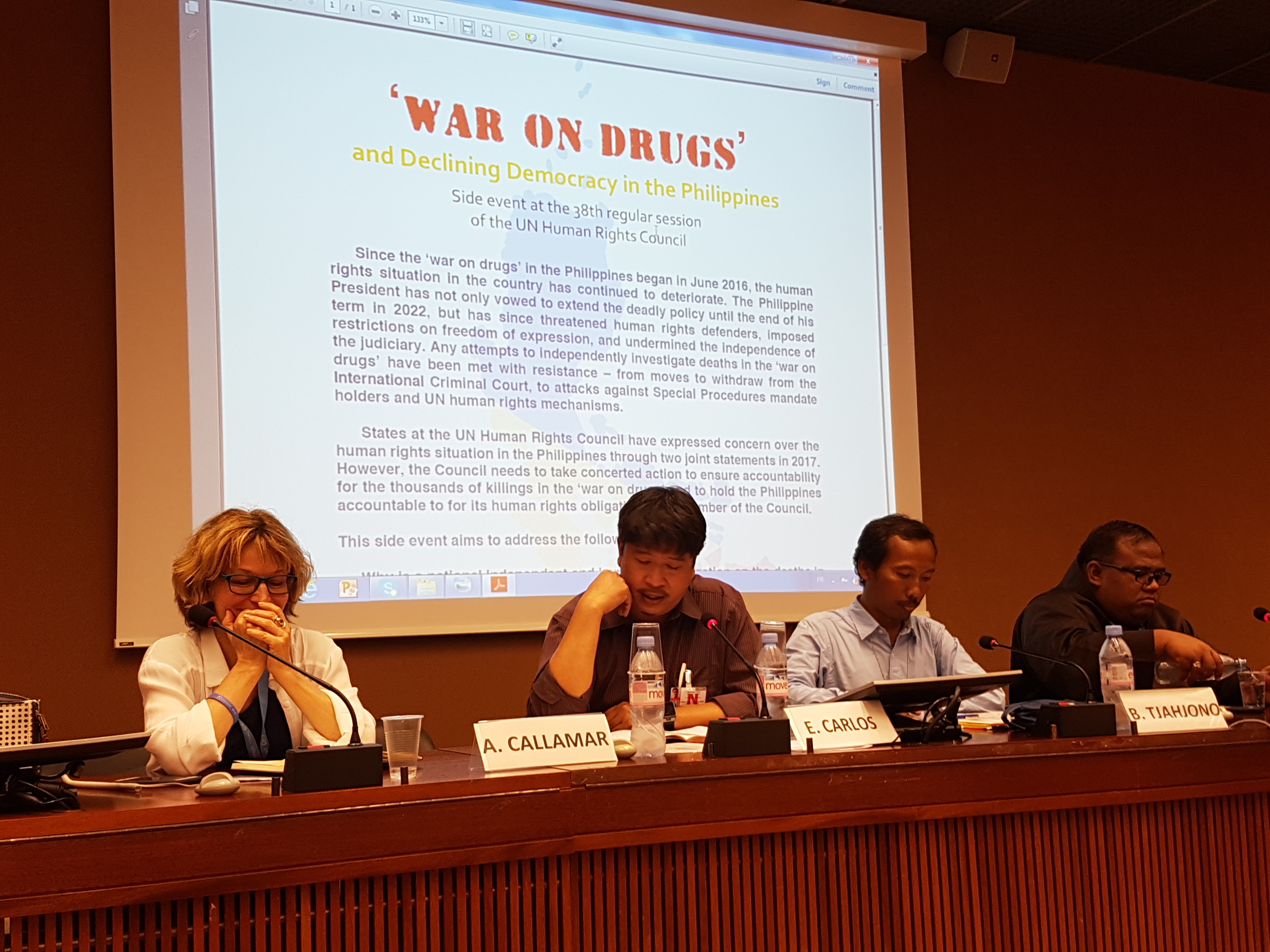
Agnes Callamard, UN Special Rapporteur on extrajudicial, summary or arbitrary executions, argued that in the ‘war on drugs’, the government tries to dehumanise a group to the extent that killings of its members would be acceptable. The mere non-investigation of such cases, she emphasised, amounts to violations of the State’s human rights obligations. The Special Rapporteur is worried about the situation because the targets are usually those placed at the ‘bottom of society’ with no protection. Furthermore, the policy on killings has spread to also cover human rights defenders. She suggested that the OHCHR, WHO and other international organisations, alongside national organisations, should document these human rights abuses in order to have enough evidence before a system which could one day deliver justice to the victims.
Dalit Women Fight against Caste-Based Violence
FORUM-ASIA co-organised a side event on caste-based violence against Dalit women on 21 June 2018 together with Anti-Slavery International, Franciscans International, Human Rights Watch (HRW), International Dalit Solidarity Network (IDSN), International Movement against All Forms of Discriminations and Racism (IMADR), and Minority Rights Group. The event was moderated by John Fisher – HRW UN Advocacy Director.
Asha Kowtal, General Secretary of the All India Dalit Mahila Adhikar Manch, commented on a short video clip portraying the situation of Dalit women, saying that it was a strong call for action for justice. She stressed that caste-based violence is different from that of gender-based violence and referring to the UDHR‘s 70th anniversary, she said that there is no point in celebrating it while the most heinous crimes of our time are being committed. In conclusion, she mentioned two cases of rape of Dalit women wherein victims committed suicide or were left to die, without any police action taken.
Vrinda Grover, Senior Advocate at the Supreme Court of India, stated that whilst violence against women in India is foregrounding, due to the caste system, the same violence against Dalit women is not covered by the media. She stressed that human rights organisations should bring this to the forefront. She also mentioned that there are two acts in India tackling such violence namely the Penal Code and the Law on the Prevention of Atrocities against Schedule Castes and Tribes. However, in the case of Dalit women, both laws are frequently breached. While Dalit women are aware of their rights, poverty and the institutional impunity in the judicial system in India discourage them from pursuing their cases. She further elaborated that perpetrators come from an economically dominant class with victims from the poor community. She emphasized that due to the impunity, Dalit women cases are either not registered or delayed in registration. She concluded by emphasising that rights are enshrined in law and are not charity from the state.
Dubravka Šimonović, UN Special Rapporteur on Violence against Women, stated that the mandate is aware of the problem and has engaged with it through a number of communications. She encouraged Treaty Bodies to build on the information, and Dalit women rights activists to increase communications with UN human rights mechanisms to show that the government is not doing enough. The Special Rapporteur agreed that there is a systematic problem in the country with regard to dealing with cases of abuses against Dalit women, and stressed that immediate action needs to be taken. She concluded by pointing out that UN mechanisms should be used strategically.
Rita Isazk Ndiaye, Member of the UN CEDAW Committee, focused on the root causes of discrimination against Dalit women and how to counter them. She believes that one of the main causes is the mind set and education of people. She suggested that we need to educate our children about equality among fellow human beings irrespective of their social status and other indicators. She further pointed out that Dalit women rights defenders do not use all UN human rights mechanisms. She added that Dalit women have many allies in the UN but they need to talk to all mechanisms, including Special Procedures and Treaty Bodies. Addressing the Dalit women rights defenders, she concluded: “don’t only come to us when there is a review of your country, you can come to us at every time, send us letters and send us reports because we are happy to know what is going on.”
Foreign Policy and Human Rights in the Global South
To launch the publication “A Collection of Thoughts from the Global South on Foreign Policy and Human Rights”, FORUM-ASIA co-organised a side event together with Conectas Human Rights, Comisión Mexicana de Defensa y Promoción de los Derechos Humanos (CMDPDH), and Commonwealth Human Rights Initiative (CHRI), on 21 June 2018. The event was moderated by Gustavo Huppes of Conectas. In his introduction, Gustavo emphasised the need to have an accessible human rights foreign policy. He argued that while decisions made by ministries of foreign affairs have a direct impact on peoples’ daily lives, the institution itself has not been seen as an accountable public body. He concluded that foreign policy consists of different patterns, and should not be summarised only into states’ voting patterns at international bodies.
Iniyan Ilango of FORUM-ASIA, spoke on the overall condition of interaction between NGOs and foreign policy. While foreign policy is public policy, it remains out of sight from the public as a secretive policy, often based on national interest and realpolitik considerations. He added that it is critical that at least when it comes to foreign policy related to human rights, states are open, transparent and participative. He further explained that it is in this context, several NGOs in the global South began working on foreign policy and human rights – in an effort to democratise foreign policy. He further explained that it is the experience that came out of this that lead to the publication.
Olga Guzman of CMDPDH, explained the human rights situation in Mexico and focused on the role played by NGOs in pressuring the government to stop its campaign against human rights defenders (HRDs). She argued that the government follows a hostile policy toward NGOs at home. In the context of the so-called ‘war on drugs’, HRDs are accused of supporting ‘criminals’ and being a ‘corrupted network’ trying to make money off human rights allegations. Following this policy, the government also tried to discredit the reports and statements of regional and international human rights mechanisms on human rights abuses. In response, Mexican NGOs started campaigning internationally to pressure the government through international human rights bodies. This proved successful with statements by a group of Special Rapporteurs and other mechanisms on the abuses.
Focusing on India and the Maldives, Yashasvi Nain of CHRI described the strategies his organisation adopted in working on human rights and foreign policy. One such case was related to advocacy on the rights of foreign prisoners in India which was an important success that lead to the release of a large number of prisoners. CHRI adopted both direct and indirect advocacy strategies by pushing both the Indian government and concerned embassies, as well as advocating through local media in the concerned countries. Although these strategies were successful, there is still room to do more to call on India to have a standard operational procedure for dealing with complaints on foreign national prisoners and to facilitate access for the embassies to the prisons.
Human Rights in Myanmar
FORUM-ASIA organised a side event on Human Rights in Myanmar on 27 June 2018. The event was moderated by R. Iniyan Ilango of FORUM-ASIA.
Razia Sultana of Rohingya Women Welfare Society described the devastating situation of the Rohingya people in Bangladeshi refugee camps. According to her, human trafficking is rampant in the camps and recently diseases have resulted from rains. She stressed that the crisis stems from decades long systemic state discrimination and persecution.
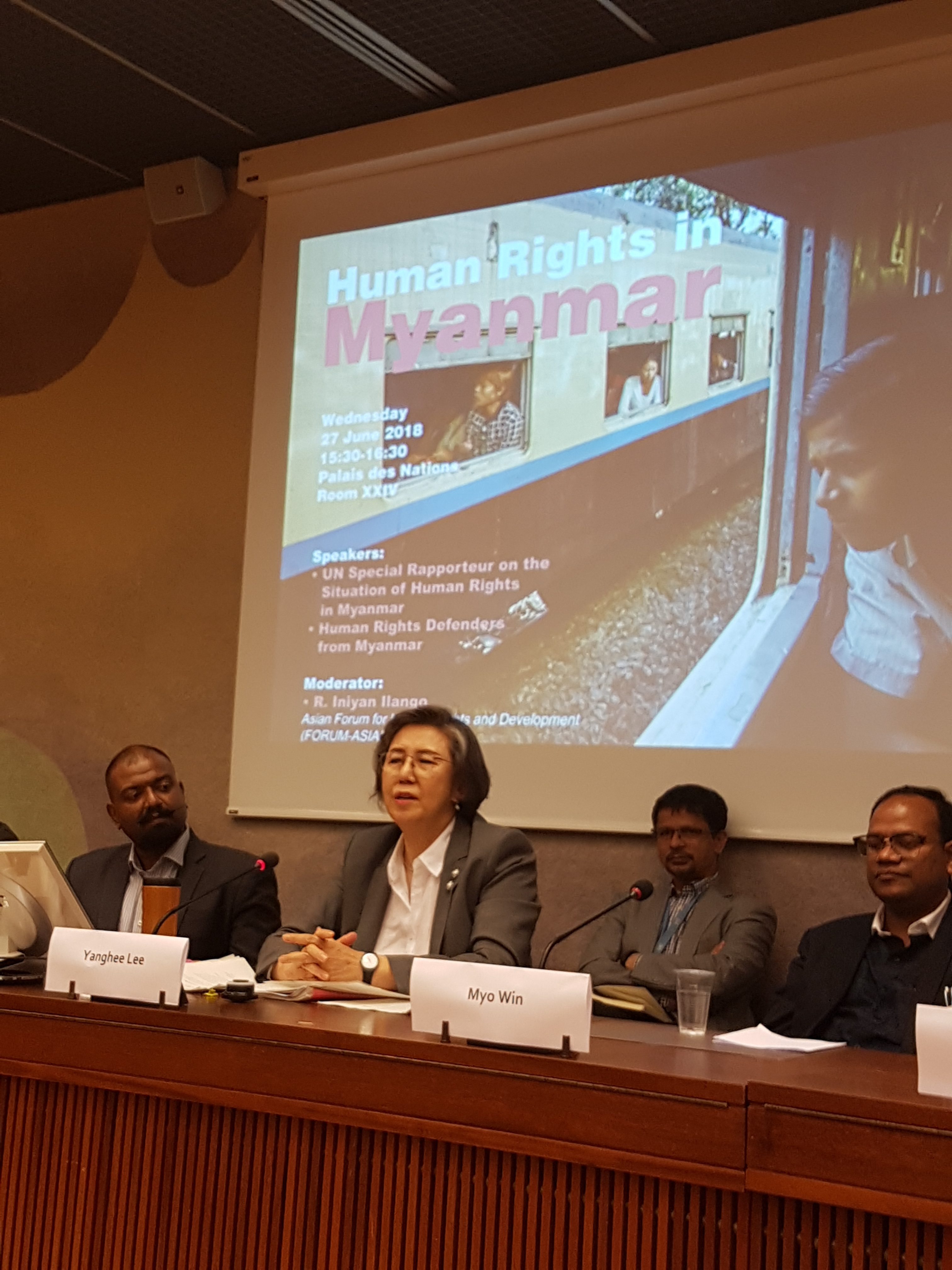
Seng Htoi of Kachin Women’s Association of Thailand stated that the Myanmar government’s discriminatory policy has targeted not only Rohingya people but also other ethnic minorities. She added that there are a number of practical reasons that prevent victims and survivors from asking for remedy at the national level, including lack of trust in the police, fear of reprisals, destruction of evidence and disappearance of witnesses, fear the police’s fear of the army, and a culture of silence.
Myo Win of Smile Education and Development Foundation noted that minorities are targeted not only in Rakhine state but also in other parts of the country. He added that there has recently been a new term used by the army, ‘positive discrimination’, to justify discriminatory policies against all minorities. It is also implemented against Buddhists who stand up for human rights and other minorities.
Aung Myo Min of Equality Myanmar stated that the human rights situation in the country has been alarming for some time. Recent cases are a new reflections of traditional patterns of human rights violations. With regards to human rights defenders he stated that there are a number of laws to restrict their activities and have been used as a suppressive instrument against them.
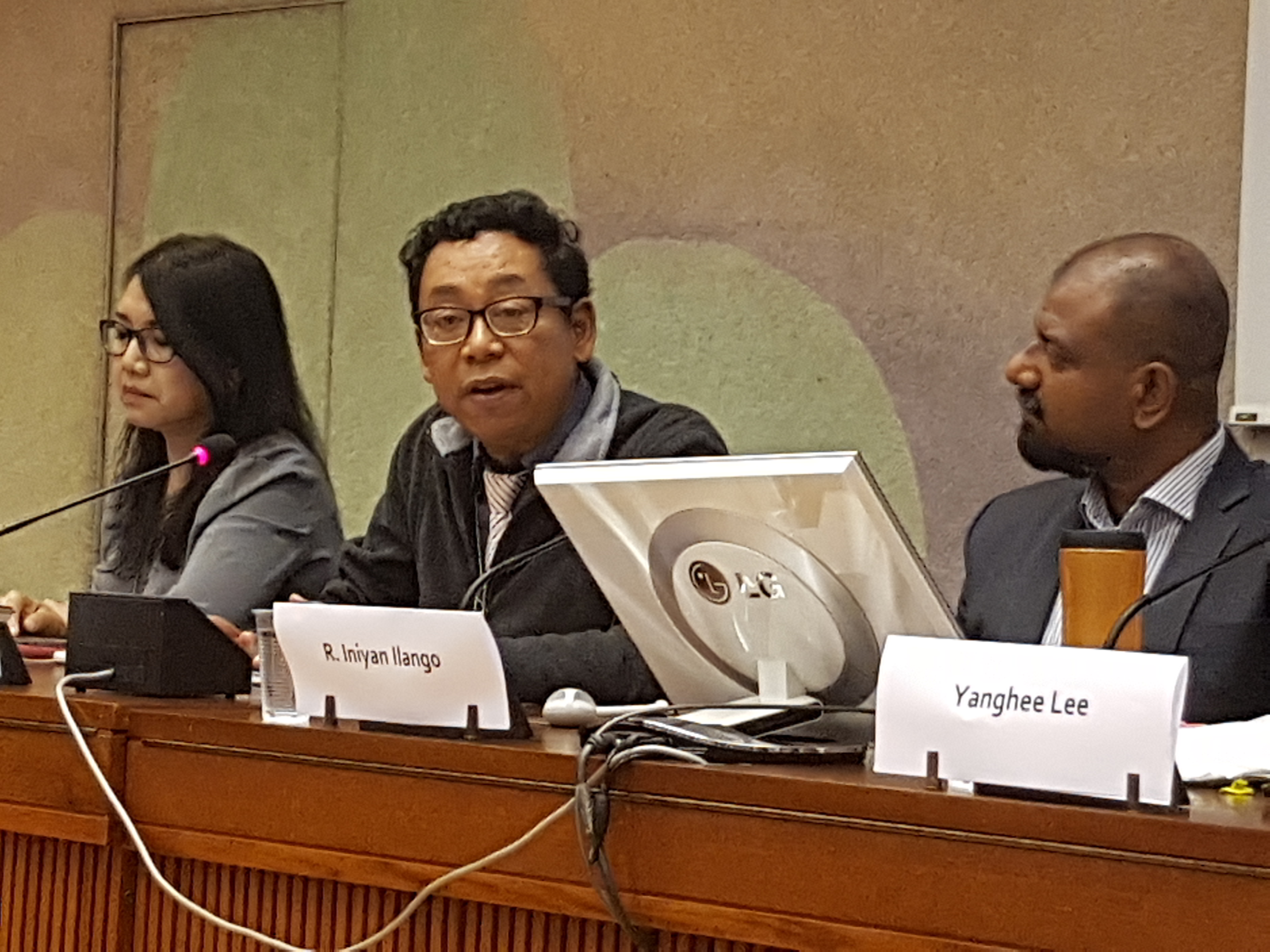
Khin Ohmar of Progressive Voice, referred to a call by a number of civil society organizations in Myanmar to refer the country’s situation to the International Criminal Court (ICC). She concluded by calling upon the international community to establish an international accountability mechanism.
Yanghee Lee, Special Rapporteur on the situation of human rights in Myanmar reflected on the implications of the government’s recent measures against journalists and minorities. She stated that the solution is to break the circle of impunity. Referring to the government’ recent announcement of a domestic Commission of Inquiry she states that previously 10 similar Commissions of Inquiry sate up by the government since 2012 were neither independent nor able to deliver real justice to the victims. She further stated that while current preliminary efforts at ICC is a good option it may have limitations in fully covering the Myanmar situation, unless there is a Security Council referral. She concluded that there is an urgent need for the UN to set up an international mechanism to properly deal with the situation. She added that the components and functions of such a mechanism have been detailed in a concept note that she has worked on and can be found on the OHCHR website.
Role of Pledges in Promoting Accountability and Strengthening the Human Rights Council
FORUM-ASIA spoke at a side event organised by the Commonwealth Human Rights Initiative (CHRI), which discussed varying performances of Commonwealth States at the UN Human Rights Council on 29 June 2018. Richard Bourne of Ramphal Institute moderated the event.
Presenting CHRI’s report on the topic, Bourne explained the system of pledges and compliance with reporting obligations before the Treaty Bodies of the Commonwealth states in the report. He further discussed challenges faced by Commonwealth states in terms of engagement with the Council and its Special Procedures. Mentioning Vanuatu as a Champion, he concluded by stressing the need for the adoption of policies aimed at improving citizens’ human rights.
Iniyan Ilango of FORUM-ASIA discussed the role of pledges at the Council by explaining the history behind this process. He stated that the idea behind pledges was to open the Council to human rights respecting states. However, the problem with the pledges is that they are either not made, or after they are made, they are often forgotten. He added that while pledges are an important tool to judge states’ before elections the practice of “clean slates” (where regional groups pre-arrange and field the same number of candidates as there are vacancies, hence avoiding competitive elections) nullifies it. For the purpose of making pledges more useful, Iniyan suggested using them widely in the UPR (where it is one of the bases for the review) and in submissions to Treaty Bodies. Iniyan described the Mongolian experience of making strong pledges through a process of consultations with civil society as a best practice. He said this was a starting point to monitor states’ performance at the Council. Iniyan further stressed the need for the use of pledges by UN human rights mechanisms. He concluded that pledges have a persuasive value and are weighty, but their weight should not make us shy away from using them.
Christine Chung of the Asia-Pacific Section of OHCHR, explained the role of pledges in promoting accountability. However, it is very difficult to measure them given that pledges are quite vague. Drawing on the experience of Australia in the Council, she highlighted its positive role both as a human rights supporter of the Pacific-Island states and also its cooperation with the Council globally. Turning to Pakistan as an example for testing the follow up with pledges, she said that it would be useful to look at them as a complementary document of commitment as they are too general and vague. However, she added that there are some commitments in the pledges by Pakistan, which could be measured by outsiders (for instance, the invitation to the Special Rapporteurs on the right to food and on association). She concluded that there is no knowledge of the pledges as a voluntary commitment outside of Geneva, especially on the ground.
Nicolas Agostini of Defend Defenders discussed the usefulness of pledges. To that end, he stated that 87% of members in 2016 submitted voluntary pledges – an increase from 57%, adding that it is now politically difficult to justify the failure to make pledges. The problem, he stressed, is that of clean slates, which weaken the Council. Nicolas suggested that there should be additional incentives for states to submit pledges and commitments. Making a reference to Burundi, he explained the negative effects of the clean slates practice, led to democratic states ironically voting for Burundi in New York while criticising it in Geneva. Nicolas then turned to the states within his mandate, Rwanda and Kenya. Rwanda had made no pledge or commitment when applying for Council membership. On the other hand, Kenya did submit pledges but did not update them for its second term. He then looked at the voting patterns on country resolutions: In March 2018, the Council adopted a resolution on Myanmar. Kenya abstained, Rwanda voted in favour. Rwanda did not make pledges or commitments but supported important country specific resolutions. Meanwhile, Kenya made pledges and commitments, yet did not support resolutions on country specific situations. Thus, Nicolas argues that in the pledges and commitments, there should be specific references to the mandate to respond to situations of concern. He concluded that taking action against human rights abusing states should be added in pledges by states that wish to become members of the Council.
Miloon Kothari, President of UPRInfo, spoke about the notion of pledges and how interesting it would be to use this methodology of the CHRI report for all states in the Council, not just the Commonwealth. He asked if pledges were indeed a precondition to Council ascension. If not, perhaps this should be a suggestion made to the Council. Miloon added that it would also be good to discuss pledges at the national level, in parliament. He also suggested that as pledges are part of states’ international commitments towards increasing accountability. To that end, he highlighted the need for more consistency between types of pledges by states. Miloon noted that pledges were supposed to be a mechanism of increasing states’ accountability to their international commitments. He concluded by saying that there is a huge gap between states’ commitments and what is shown in the report by CHRI.

